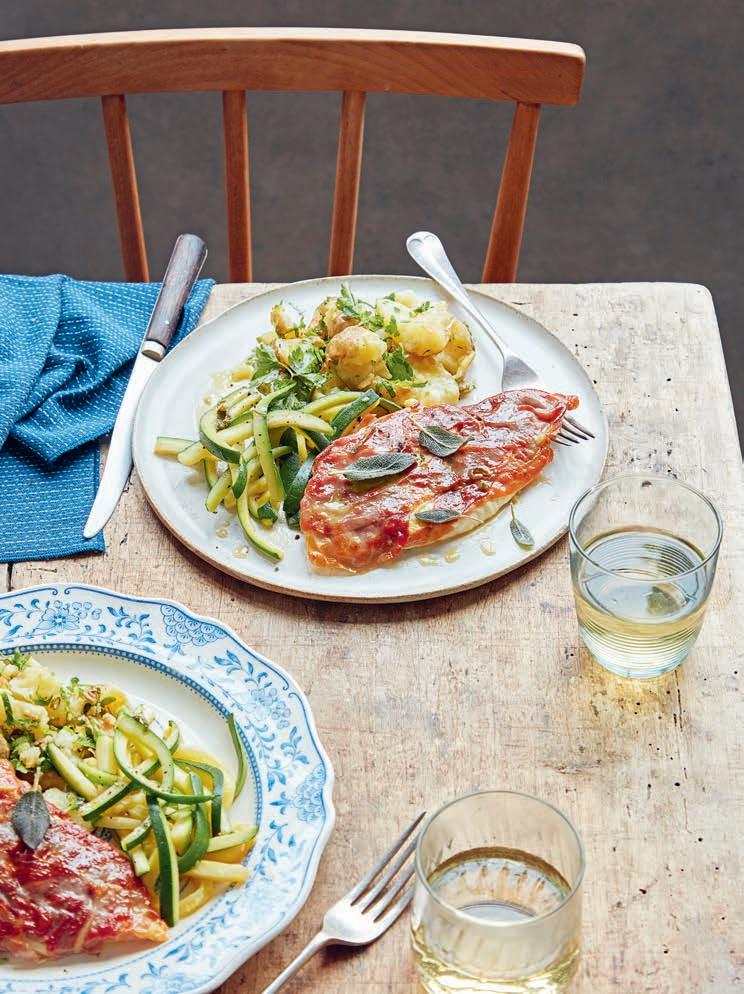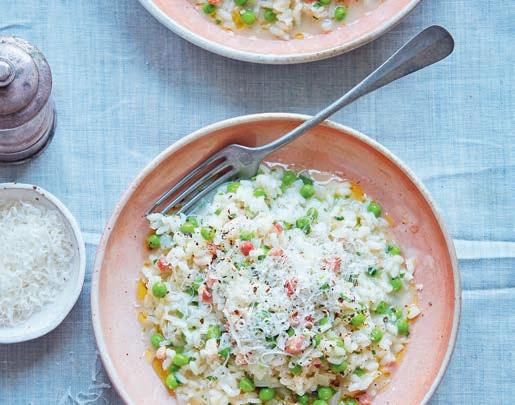
7 minute read
Bites
Portions for Pairs
A fresh take on cooking for two
The kitchen is a communal space that brings groups of every size together. So recipes for cooking and connecting don’t need to be limited to serving four or more people, especially since there are a great number of two-person households that include couples, friends, and roommates. With pairs in mind, Orlando Murrin created a resource for those with a small home base to enjoy a meal designed for two—eliminating the need to halve or third recipes designed to serve more—or to have multiple days’ worth of leftovers. His cookbooks, “Two’s Company” and “Two’s Company Simple,” which releases in September, offer options to aid in cooking for relaxation, fun, and companionship. While cooking for two is different than making meals in large batches, Murrin gives step-bystep instructions and suggestions to keep home chefs aware of all their tasks and the overall goal. The books feature Murrin’s bevy of delectable recipes that bring pleasure and ease back to cooking for two, including the following duo from “Two’s Company.” —SAMANTHA JOHNSON
RECIPES AND PHOTOS FROM “TWO’S COMPANY” BY ORLANDO MURRIN © 2021 REPRINTED WITH PERMISSION FROM RYLAND, PETERS & SMALL. PHOTOS BY CLARE WINFIELD.
Chicken Saltimbocca with Crushed Herby Potatoes and Zucchini
MAKES 2 SERVINGS
The Italians have a poetic touch when it comes to naming dishes—saltimbocca means literally “jump in the mouth.” Crisp sage leaves add a pretty finish to this dish, and yes, they are meant to be eaten. The green vegetable can be varied according to the season. –orlando murrin
For the Chicken Saltimbocca and Zucchini
About 12 fresh sage leaves A small handful of other fresh herbs, such as parsley and chives 2 chicken breast fillets, skinless and boneless 4 prosciutto slices 2 tablespoons butter 1 tablespoon olive oil 1 zucchini, cut into batons, or 5½ ounces asparagus or green beans, trimmed 1 garlic clove, thinly sliced ¾ cup chicken stock, dry vermouth, or white wine, or a mixture About 2 teaspoons lemon juice
For the Crushed Herby Potatoes
9 ounces small red or white potatoes, scrubbed and halved (about 2 handfuls) 2 tablespoons butter A small handful of fresh herbs, such as parsley and chives, chopped
1. Pick out the 4 to 6 most handsome sage leaves and chop the rest finely. While you are at it, chop the other herbs. If you are making the potatoes, chop the herbs for these now, too, and set aside separately. Slice each chicken breast in half horizontally, to form 4 cutlets, cover with a sheet of plastic wrap, and bash each with a rolling pin until they are an even 3⁄8-inch thick. Dab the cutlets dry with a piece of paper towel, season all over with salt and pepper, and sprinkle the cut sides with half the chopped sage. Press the prosciutto slices on the cut, sage-flecked sides, tucking the edges under on themselves to follow the shape. Put on a plate and refrigerate. 2. For the crushed herby potatoes, put them in a small pan, add water to cover by about ¾ inch, salt generously, and boil for 12 to 15 minutes, until soft but not falling apart. Drain. Put the butter into the pan, plus the chopped herbs and seasoning, then stir in the potatoes, squashing each one lightly with a wooden spoon or spatula so it breaks up and absorbs the buttery herbs, but without mashing. Check the seasoning, cover, and keep warm. Cook the zucchini batons in a pan of salted, boiling water till just tender—3 to 5 minutes depending on size—then drain and keep warm. 3. Heat the oil in a large frying pan and when shimmering, add the sage leaves. Cook for just 30 to 40 seconds till they darken and stiffen, then transfer with tongs to a small plate lined with paper towels. Sprinkle with salt and set aside. Now add the chicken to the pan, prosciutto-side down. Cook for 2 minutes until a narrow white line appears around the top edge, check the underneath is bronzed, then flip over for 2 minutes to cook through. Transfer to a plate and keep warm. 4. Add the garlic and remaining sage to the frying pan and sizzle for 30 seconds until fragrant, then pour in the stock. Bubble the sauce for 3 to 5 minutes until reduced by about half and slightly thickened. Reduce the heat and whisk in the butter in 2 pieces. Then when it has melted, add lemon juice and seasoning to taste. Swirl in the zucchinis. 5. Use tongs to arrange the seasoned zucchinis on serving plates, top with the saltimboccas, drizzle with sauce, and top each with a few crisp sage leaves. Serve the potatoes alongside. n

Classic Risotto with Bacon and Peas
MAKES 2 SERVINGS
Risotto is one of the best storecupboard standbys, enabling you essentially to make a gourmet dinner out of rice, stock, Parmesan, and whatever comes to hand. I think of it as a “Monday meal,” made with fresh chicken stock after Sunday’s roast. Here, I flavor the risotto with bacon and peas, but check your fridge for enticing scraps. I usually grate my Parmesan in a food processor, but to finish a risotto, I risk my knuckles on a Microplane grater, which gives an attractive snowy effect. –orlando murrin
1¾ cups chicken stock
A splash of olive oil 2½ tablespoons butter, divided 2¾ ounces bacon, chopped, or cubed pancetta or lardons 1 small onion, chopped 1 garlic clove, crushed ½ cup (heaping) risotto rice
About 31⁄3 ounces/1⁄3 cup (1 small glass) white wine or dry sherry 1 bay leaf ½ cup frozen peas, no need to defrost
A small bunch of fresh parsley, chopped 4 tablespoons grated Parmesan, plus extra to finish
1. Put the chicken stock in a pan and bring to a boil, then turn off the heat and cover to keep hot. Heat the oil and half the butter in a medium saucepan and add the bacon, onion, and garlic. Cook gently for 5 minutes, till soft but not brown, then stir in the rice. Cook for 2 to 3 minutes until the rice is slightly translucent and starting to turn gold, then stir in the wine and bay leaf and bubble until the wine has been absorbed (1 to 2 minutes). 2. Set the timer for 18 minutes and add enough stock to cover the rice. Season. From now on, aim to keep the rice covered by a thin film of stock at all times, and at a gentle simmer. Stir frequently and add more stock as necessary. At 18 minutes, stir in the peas and bring back to the boil. At 19 minutes, check the rice is tender—it should still have a slight bite to it—and adjust the seasoning. Cook for another minute, if necessary, then turn off the heat. Remove the bay leaf, if you wish; though if you leave it in, it will bring good fortune to the person to whom it is served. 3. Pause a couple of minutes—time to set the table. Then fold in the parsley, grated Parmesan, and remaining butter using a rubber spatula. Transfer to heated bowls, dust with extra Parmesan, and serve.
Cook’s Note:
Italian cooks know that after stirring a risotto for a solid 20 minutes, it is essential to leave it sitting undisturbed in the pan for 5 more before tucking in “so the ingredients get to know one another.”









